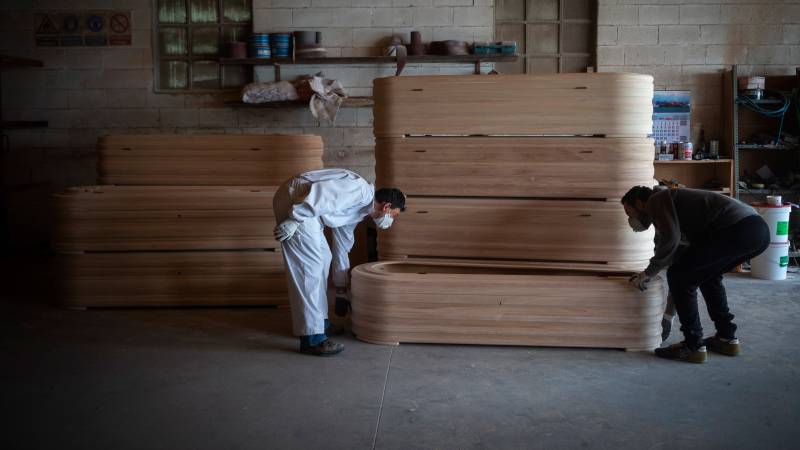Spain village churns out coffins as death doubles demand

Stay tuned with 24 News HD Android App

It may be small but Pinor village in a remote corner of northwestern Spain has the peculiar distinction of being known for coffins, with coronavirus death doubling demand at its nine workshops.
Spain is suffering one of the world's most deadly outbreaks that has killed more than 18,500 people in just two months.
For mayor Jose Luis Gonzalez, the pandemic has sent the amount of work soaring for those in the coffin-making business in this village of just over 1,000 people.
"Since (the crisis) began, we've seen demand double from normal levels," he told AFP.
At his own business, which he inherited from his father, that has meant workers constructing "around 400" coffins a month, when they would normally be producing half that number.
With deaths mounting daily, the funeral industry has also come under pressure because the usual imports of caskets from China "are no longer arriving".
These days, the coffin-makers of Pinor are taking orders from across Spain despite initial supply chain concerns when the lockdown began on March 14, which triggered "panic that we might run out of caskets".
In order to meet demand, the village's craftsmen have had to speed up and simplify their way of working.
"We work many more hours and the coffins are more basic in terms of quality," he said, explaining that they were plain varnished wooden caskets without any of the usual marble or glass adornments.
Plenty of pine
As to why such a small village would have so many businesses working in such a specialised trade, Gonzalez pointed to the abundance of pine trees in this area of Galicia.
"It's a good place for casket-making because you have all your primary material in the area," he said.
Over the years, tastes and trends have changed the look of traditional coffins.
Until about 25 years ago, all caskets were "rectangular and made of pine", he said.
But since then, there has been a demand for softer lines "and pine doesn't lend itself well to curves," he said.
So instead of pine they have started using formaché, a new material made of paper fibres which when dry, looks like stone.
Imported from Ivory Coast, it is then moulded in Valencia.
Until now, the village itself has not seen a single case of coronavirus, but the mayor and his team are keeping a close eye on residents.
"I call my neighbours and the elderly almost every day. Everyone has my mobile number," says Gonzalez whose staff have been helping out by bringing food and medicines to the most vulnerable.
